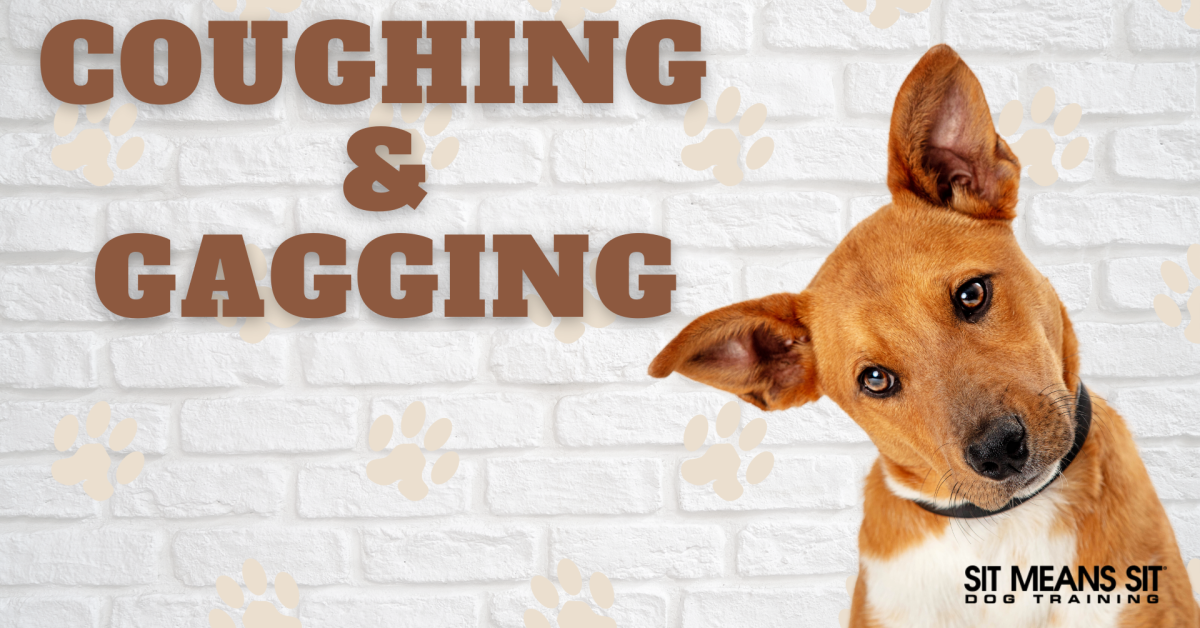
What Should I Do If My Dog is Coughing & Gagging
Dogs can cough or gag for a variety of reasons. Sit Means Sit understands that this can be concerning. Are they having difficulty breathing, reverse sneezing, suffering from kennel cough, or is your dog coughing up a simple hairball? To help your pup in times of a chronic cough, scratchy throat, or stuck objects, it’s essential to pay attention to the type of cough they are producing and recognize if there are any other symptoms.
Why Do Dogs Cough?
Just like their human counterparts, coughing and gagging are ways for dogs to move something out of the airway in their throat. Whether it can be foreign objects like grass, dust, or their entire bone, your pet comes into contact with lots of throat scratchers. An occasional cough is nothing to fret about, but repetitive coughing is when a red flag should be raised. If you are worried about your pup suffering from kennel cough or other respiratory infections, your vet is just a phone call away.
Types of Dog Cough
Kennel Cough
- A deep, dry, hacking cough
Kennel cough is described by the AKC as tracheobronchitis, which is a contagious pet disease caused by a number of bacteria or viruses, usually caught from other dogs at doggy daycare or boarding facilities.
If your coughing dog’s symptoms become worrisome, talk to your vet about a treatment plan. Your vet will prescribe some general antibiotics or cough suppressants for Fido and have them social distance until the infectious stage is over. Your dog’s health will be back to normal before you know it! However, while they are recovering, make sure to keep them away from other dogs. Kennel cough is very contagious, but your dog will recover and be playing with their friends before you know it!
This is not always a serious disease, but it can spread to the lungs and cause more detrimental illnesses. Old dogs, puppies, and brachycephalic breeds (like Pugs, Bulldogs, and Boston Terriers) are especially susceptible to kennel cough complications, such as issues with the respiratory tract, chronic bronchitis, or phenomena. While kennel cough does not always need immediate veterinary attention, if you have a high-risk infected dog suffering from respiratory distress, please consider a more immediate vet visit.
Sore Throat
- High-pitched, gagging, and coughing
A doggy sore throat is just as common as a human’s. A high-pitched cough can be an indicator of upper airway irritation/infection or a blockage in the dog’s throat, or in some cases, the second stage of mouth disease. Check with your vet to have them either properly remove the object or check for infections. Look out for other symptoms that might point toward a more serious issue affecting your dog’s health.
Lung Problems
- Wet, phlegmy, moist cough
If you’re hearing your dog gagging and making more phlegmy noises around the house, there’s a chance they have an underlying respiratory condition with fluid in their lower airways. Fluid accumulation in the lungs is very dangerous.
This cough will be paired with labored breathing or a runny nose. If your pet is coughing like this, get immediate vet care ASAP. These symptoms could be a sign of severe respiratory infections or an attack on your dog’s immune system, requiring urgent medical attention to get your dog healthy again.
Tracheal Collapse
- Deep, honking cough
Unfortunately, tracheal collapse is pretty common in toy-sized breeds, and one of the most noticeable symptoms is a goose-like honking cough. To avoid hurting your pet’s throat and trachea, avoid tugging on their leashes and avoid hot temperatures when exercising.
Pet owners with small dogs often choose a secure harness instead of a collar. Harnesses are a safer choice to help prevent a collapsing trachea by taking the pressure off the throat. Also, consider early morning walks during extreme summer heat, as well as making sure they have plenty of shade during the day!
Heart Disease
- Coughing while sleeping/lying down
When your heart is not properly pumping blood through it, fluid can build up in the lungs. Heart disease is one of the leading causes of pet fatalities, and coughing can either be a sign or a side effect. This is not always a persistent cough, but it will be most prevalent when they’re lying down. If this occurs, call your vet to make an appointment. Dogs with an early detection of heart disease can thrive if placed on the right treatment plan!
Other Causes
Below are other canine health issues where a persistent cough is an underlying condition. If you are worried about your dog’s health, please schedule an appointment with your vet immediately.
- Temperature
- Heartworm Disease
- CIV (Canine Influenza Virus)
- Chronic Bronchitis
- Cancer
Should I Call the Vet?
If the cough is repetitive or when they’re lying down, call the vet. If they sound like something is lodged in their throat, ask your vet whether to induce vomiting or bring them into the office. Gagging and coughing could be caused by something as simple as grass stuck in their throat or an easy-to-treat case of kennel cough. However, a coughing dog could be a sign of a serious condition that could endanger your dog. Catching a cough early can improve your pet’s health and happiness, and even save their life.
Coughing can be difficult to prevent if your dog has an issue with ingesting random things like grass. Check out this article if your pup has a grass-eating problem that’s making them cough!
